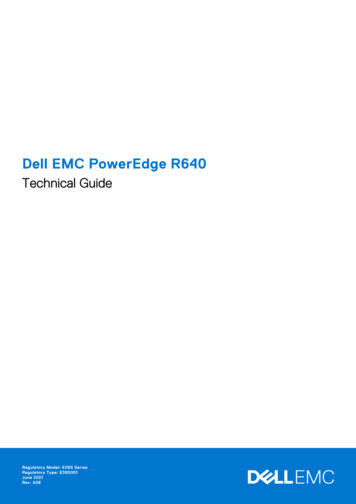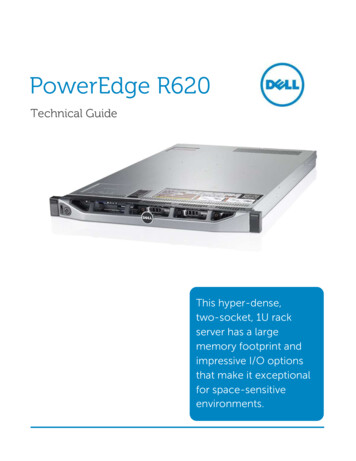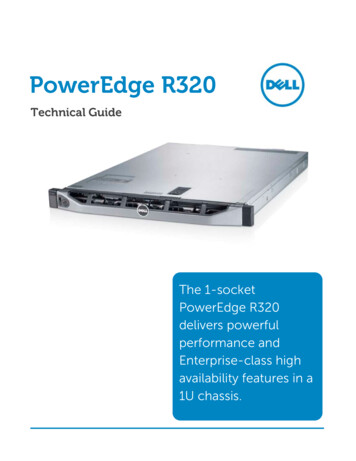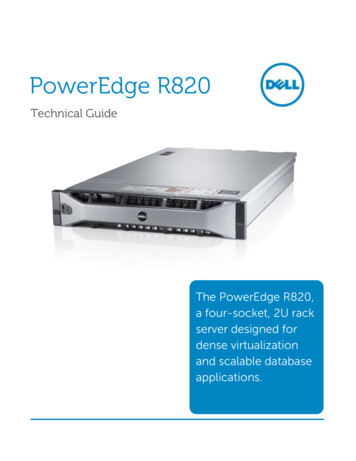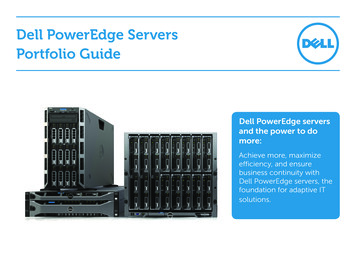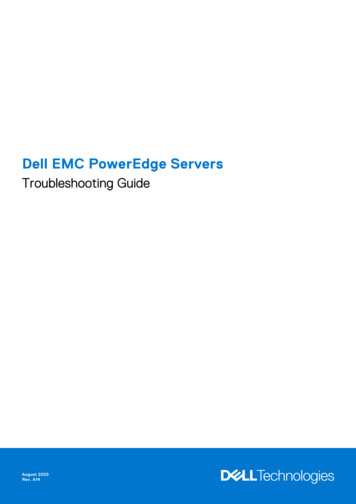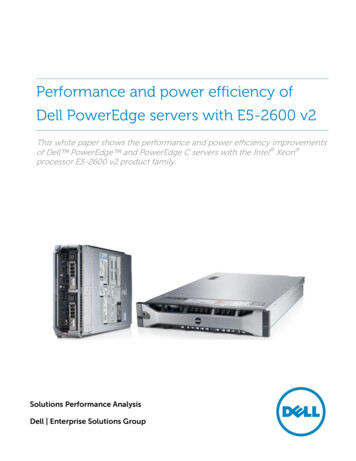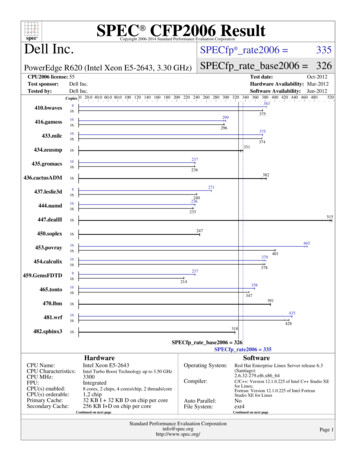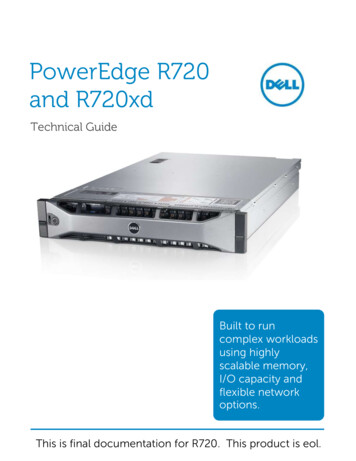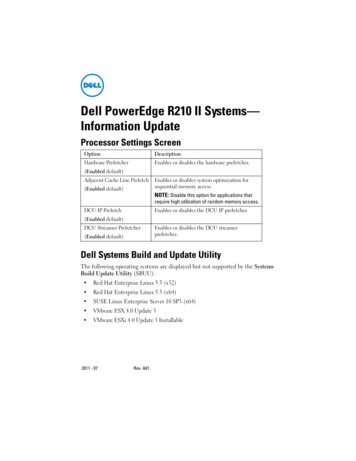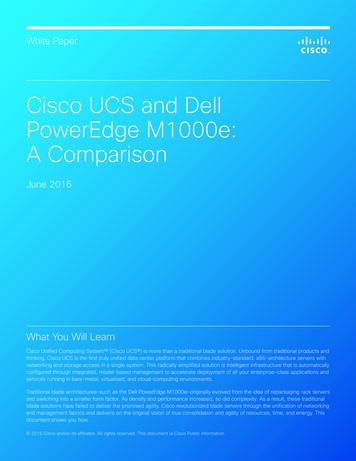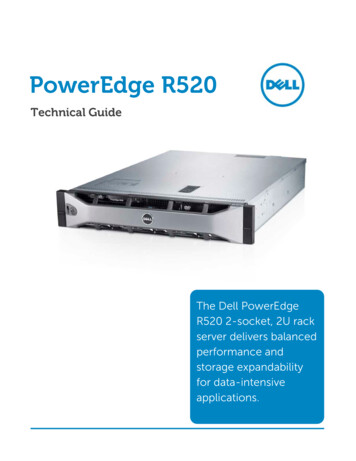
Transcription
PowerEdge R520Technical GuideThe Dell PowerEdgeR520 2-socket, 2U rackserver delivers balancedperformance andstorage expandabilityfor data-intensiveapplications.
This document is for informational purposes only. Dell reserves the right to make changes without furthernotice to any products herein. The content provided is as is and without express or implied warranties ofany kind.Dell, the DELL logo, PowerEdge, EqualLogic, PowerVault, PowerConnect, OpenManage, KACE, and ReadyRailsare trademarks of Dell, Inc. Intel and Xeon are registered trademarks of Intel Corporation in the U.S. and othercountries. Microsoft, Windows, Windows Server, SQL Server, BitLocker, ActiveX, Internet Explorer, and Hyper- Vare either registered trademarks or trademarks of Microsoft Corporation in the United States and/or othercountries. Novell and SUSE are registered trademarks of Novell, Inc. in the United States and other countries.IBM, Tivoli, and Netcool are registered trademarks of IBM in the United States. Other trademarks and tradenames may be used in this document to refer to either the entities claiming the marks and names or theirproducts. Dell disclaims proprietary interest in the marks and names of others. Copyright 2012 Dell Inc. All rights reserved. Reproduction or translation of any part of this work beyond thatpermitted by U.S. copyright laws without the written permission of Dell Inc. is unlawful and strictly forbidden.December 2012 Version 3.0iiPowerEdge R520 Technical Guide
Table of contents1 System overview .5Introduction .5New technologies . 62 System features . 7Comparison of PowerEdge systems . 7Specifications . 83 Chassis views and features . 10Chassis views . 10Chassis features . 124 Processor . 15Processor features . 15Supported processors . 15Chipset . 165 Memory . 17Supported memory . 17Memory configurations .18Memory speed . 19Memory RAS features. 196 Storage . 21Internal storage . 21External storage . 22Storage controllers . 22Optical drive . 23Tape drive. 237 Networking and PCIe . 24Embedded NIC controller . 24PCIe expansion . 248 Power, thermal, and acoustics . 26Power consumption and energy efficiency . 26Power supply units . 27Thermal and acoustics. 289 Rack rails and cable management . 31Sliding and static rail systems . 31Cable management arm. 3310 Operating systems and virtualization . 34Supported operating systems. 34Supported virtualization . 3511 Dell OpenManage systems management . 36Systems management solutions . 36OpenManage systems management . 37Dell server management operations . 42Appendix A.Additional specifications . 44Chassis dimensions . 44Chassis weight. 44Power supply specifications . 45Environmental specifications . 45Video specifications . 46Rack rail specifications . 47USB peripherals . 47Appendix B.iiiStandards compliance . 48PowerEdge R520 Technical Guide
Appendix C.Additional resources. 49Appendix D.System board block diagram . 51TablesTable 1.Table 2.Table 3.Table 4.Table 5.Table 6.Table 7.Table 8.Table 9.Table 10.Table 11.Table 12.Table 13.Table 14.Table 15.Table 16.Table 17.Table 18.Table 19.Table 20.Table 21.Table 22.Table 23.Table 24.Table 25.Table 26.Table 27.Table 28.Table 29.New technologies . 6Comparing the PowerEdge R510 to PowerEdge R520 . 7Technical specifications . 8Chassis features . 12Security features . 13Supported processors . 16Memory technologies supported . 17DIMMs supported .18Memory speed capabilities . 19Memory RAS features . 20Supported hard drives . 21Supported RAID controllers. 22PCIe slot configurations . 24Supported NICs and HBAs . 25Power tools and technologies . 26Power supply efficiency . 28Acoustical performance . 30Supported rack types . 32Primary operating system support . 34Virtualization support . 35iDRAC7 with Lifecycle Controll
The Dell OpenManage systems management portfolio includes I ntegrated Dell Remote Access Controller 7 (iDRAC7) with Lifecycle Controller. This embedded feature helps IT administrators manage Dell servers in physical, virtual, local and remote environments, operating in- band or out-of-band, with or without a systems management software agent. OpenManage also integrates and
